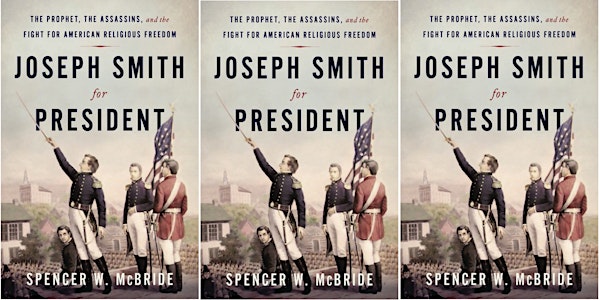The story of Joseph Smith’s presidential campaign and how his calls for religious freedom through constitutional reform are essential to understanding how the American political system evolved to what we know today.
Join us as author and historian Spencer McBride discusses one of the most important elections in American history and the focus of his latest book, Joseph Smith for President: The Prophet, the Assassin, and the Fight for American Religious Freedom.
By the election year of 1844, Joseph Smith, the controversial founder of the Church of Jesus Christ of Latter-day Saints, had amassed a national following of some 25,000 believers. Nearly half of them lived in the city of Nauvoo, Illinois, where Smith was not only their religious leader but also the mayor and the commander-in-chief of a militia of some 2,500 men. In less than twenty years, Smith had helped transform the American religious landscape and grown his own political power substantially. Yet the standing of the Mormon people in American society remained unstable. Unable to garner federal protection, and having failed to win the support of former president Martin Van Buren or any of the other candidates in the race, Smith decided to take matters into his own hands, launching his own bid for the presidency. While many scoffed at the notion that Smith could come anywhere close to the White House, others regarded his run―and his religion―as a threat to the stability of the young nation. Hounded by mobs throughout the campaign, Smith was ultimately killed by one―the first presidential candidate to be assassinated.
Though Joseph Smith's run for president is now best remembered―when it is remembered at all―for its gruesome end, the renegade campaign was revolutionary. Smith called for the total abolition of slavery, the closure of the country's penitentiaries, and the reestablishment of a national bank to stabilize the economy. But Smith's most important proposal was for an expansion of protections for religious minorities. At a time when the Bill of Rights did not apply to individual states, Smith sought to empower the federal government to protect minorities when states failed to do so.
Spencer W. McBride is an Associate Managing Historian of the Joseph Smith Papers Project.
McBride’s publication of the same title will be available for purchase and signing after the event.
We wil not have a reception before this event. Parking will be available on the SMU campus. FREE passes will be emailed to registered guests before the event. Seating is limited, and not guaranteed. This event will be recorded and available for viewing on our website (smu.edu/cph) about a week after the event date.
TEACHERS ONLY -- Please sign in at the registration table to receive continuing education credit.
Effective August 12, SMU has implemented a temporary mask requirement in indoor spaces on campus including classrooms, event and meeting spaces, and commons areas in all buildings and residential halls, regardless of vaccination status.
We hope you can make it!
